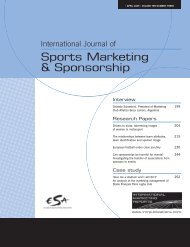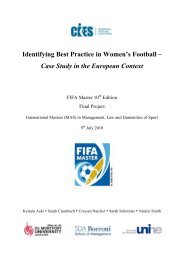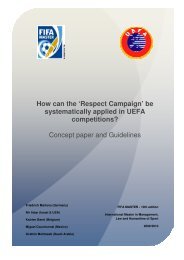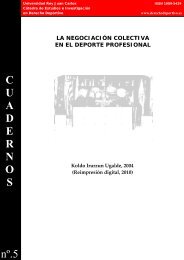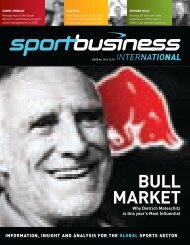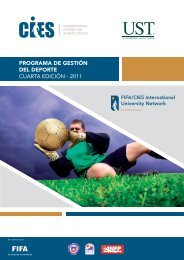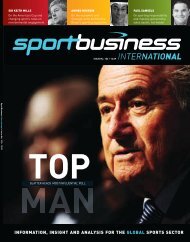Sports Marketing & Sponsorship - FIFA/CIES International University ...
Sports Marketing & Sponsorship - FIFA/CIES International University ...
Sports Marketing & Sponsorship - FIFA/CIES International University ...
- No tags were found...
You also want an ePaper? Increase the reach of your titles
YUMPU automatically turns print PDFs into web optimized ePapers that Google loves.
Sporting involvement and alcohol sponsorshipRESEARCH PAPERto promote a message of responsible drinking. A banwould have severe consequences for sport, so shouldnot be implemented without evidence that it wouldhave a noticeable effect on underage drinking.Evidence for effects on product (as opposed tobrand) perceptions from sponsorship is mainly frominvestigations of tobacco sponsorship, and is limitedand inconclusive. A study was therefore designed toexamine such effects in the context of alcohol.Following a series of focus groups with 14 and 15year olds, a questionnaire investigating sportinginvolvement, alcohol consumption and awareness andknowledge of sponsorship was drawn up andadministered to a sample of 322 pupils of a similarage. Multiple regression analysis, using the Theory ofReasoned Action framework, was used to test forsignificant predictors of young people’s self-perceivedlikelihood that they would a) drink alcohol and b) getdrunk, on the weekend following questionnairecompletion. For boys, being involved in sport predictedgreater likelihood both of consuming alcohol and ofgetting drunk, while adding sponsorship awareness tothe equation further improved predictions ofconsumption. For girls, attitudes towards alcohol werethe most significant predictor of both behaviours;sporting involvement was not a significant predictor ofeither. <strong>Sponsorship</strong> awareness showed no main effectin predicting girls’ intentions, but enhanced the effectof positive attitudes towards alcohol.Involvement in sport thus brings boys into a culturein which the use of alcohol plays a significant part,and they are influenced by this whether or not theynotice sponsors. <strong>Sponsorship</strong> by alcohol companiesplays a part in perpetuating the norms of that cultureand reinforcing positive attitudes towards alcoholconsumption. There is no evidence of sportinginvolvement, or moderate drinking messages bysponsors, acting as an incentive for boys to moderatetheir drinking. The girls in this study are less involvedin sport but have more favourable attitudes to alcohol,which are the major predictors of greater likelihoods ofdrinking and getting drunk.Solely banning alcohol sports sponsorship wouldhave minimal effect on levels of underage drinking; aserious attempt to weaken the links between alcoholand sport would require wide-ranging measures tostimulate cultural change. Health-related marketingcommunications should be used to highlight thedetrimental effects of alcohol on sporting performanceand send the message that alcohol and sport do notmix. The use of low-alcohol and non-alcohol brandsfor sports sponsorship would allow alcohol marketersto send a more socially responsible message while stillpromoting their corporate and brand identities.IntroductionWith tobacco sponsorship now banned in the UK andrecent restrictions on junk food advertising, alcoholmarketers are becoming increasingly concerned aboutthe future of their sponsorships, especially against thebackground of rising public concern about the extentof underage drinking. The previously voluntary codesof practice on alcohol advertising have already comeunder the jurisdiction of the Advertising StandardsAuthority, but so far sponsorship has remainedunregulated. However, as far back as 2001 the WorldHealth Organization (WHO) was calling for all MemberStates of the European Union to “strengthen measuresto protect children and adolescents from exposure toalcohol promotion and sponsorship” (WHO/Europe,2001), while the Europe-wide study by Anderson andBaumberg (2005) recommends the development of apan-European policy on alcohol marketing, with theultimate aim being “no advertising on TV and cinema,no sponsorship, and limitation of messages andimages only referring to the quality of the product”(p416). The European <strong>Sponsorship</strong> Association (ESA)riposte to this report denies any links betweensponsorship and alcohol misuse, cites the impact thata sponsorship ban would have on sport and otheractivities, and states its belief that alcohol companiesare already acting responsibly (ESA, 2006).26 <strong>International</strong> Journal of <strong>Sports</strong> <strong>Marketing</strong> & <strong>Sponsorship</strong> ● OCTOBER 2009 ●





